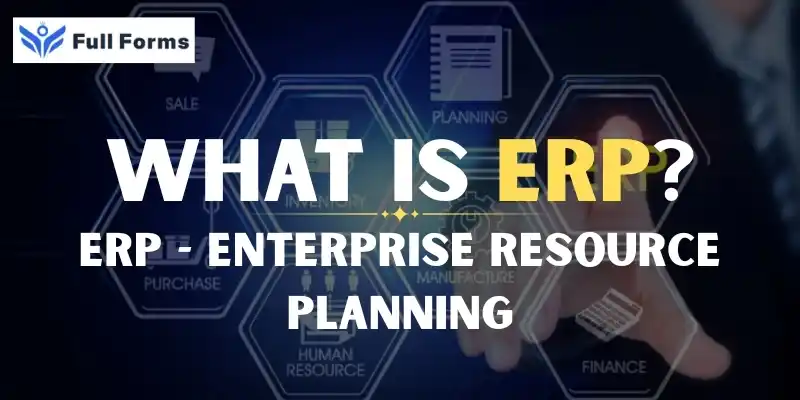Enterprise Resource Planning
(ERP)

Description
A Simple Explanation of Enterprise Resource Planning (ERP)
ERP, or enterprise resource planning, is a type of software that helps businesses run their daily operations. These tasks can include things like accounting, sales, inventory, human resources, and more. Companies can collect, store, manage, and understand data more easily when all of these different processes are in one place.
What does ERP mean?
Enterprise Resource Planning is what ERP stands for. Organizations use it to help their businesses run smoothly. Companies used to use different software for each job before ERP systems came along. For instance, one program for payroll, one for inventory, and one for sales. This made it hard for departments to talk to each other and could cause mistakes or delays.
ERP stores all of your important information in one place. This means that people in different departments can all see the same current information. For instance, the sales team puts the order into the ERP system when a customer makes one. The warehouse can see the order right away and get the items ready, and the accounting team can see the sale and update the company's finances.
What is ERP and how does it work?
There are different parts to an ERP system. For example, each module focuses on a different part of the business, like:
- Finance and Accounting: Keeps track of payroll, bills, and money coming in and going out.
- Sales and Marketing: Handles customer orders, sales, and marketing campaigns.
- Inventory Management: Keeps track of stock levels, products, and raw materials.
- Human Resources (HR): Handles employee information, pay, and benefits.
- Production and Manufacturing: Sets and keeps an eye on the schedules and quality of production.
These modules are all linked together. When you enter data into one module, it is automatically updated in all other parts of the system. This makes sure that everyone is working with the same information.
Advantages of ERP
There are many benefits to businesses that use ERP systems, such as:
- More efficient: Employees don't have to look for information or enter the same data more than once because all of it is in one place.
- Better accuracy: There are fewer mistakes and misunderstandings when there is only one source of truth.
- Faster Decision-Making: Managers can quickly see what's going on in the business and make smart choices.
- Saving Money: ERP automates a lot of tasks, which means that businesses can often do more with less.
- Better working together: It's easy for departments to share information and work together.
Problems with ERP
Setting up ERP can be hard, even though it has a lot of benefits:
- Costly: ERP systems can be very expensive, especially for small businesses.
- Difficult Setup: It takes time and skill to install and customize ERP software.
- Training: It may take some time for employees to learn how to use the new system.
- Change Management: Some employees may not want to change how they work, so companies need to be careful about how they handle this change.
Who Uses ERP?
Companies of all sizes and in many fields use ERP systems. Big businesses with a lot of departments get the most out of it because it helps them keep track of their complicated operations. But a lot of ERP providers also have solutions for small and medium-sized businesses.
Some of the most common industries that use ERP are healthcare, construction, retail, manufacturing, and education. An ERP system can help any business that has to keep track of a lot of different processes.
The Future of ERP
ERP systems are getting better all the time. A lot of them are now available in the cloud, which means that businesses don't have to buy or keep their own servers. It's usually easier to set up and use cloud-based ERP, and employees can access the system from anywhere.
ERP systems are also getting new features like AI, automation, and analytics. These tools help businesses get even more out of their data, guess what will happen next, and make better choices.
In Conclusion
Today, many businesses need Enterprise Resource Planning (ERP). ERP helps businesses run more smoothly and make better choices by bringing all of their important business processes together in one system. Setting up an ERP can be expensive and hard, but the long-term benefits usually make it worth it. Anyone who wants to know how modern businesses work and grow should learn about ERP.
